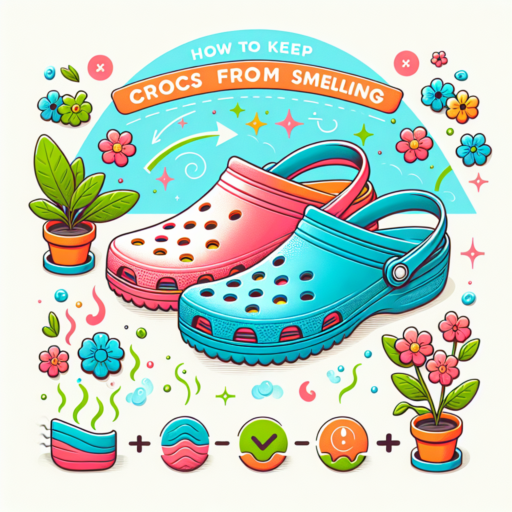No se han encontrado productos.
Understanding Why Crocs Smell
When it comes to footwear, Crocs have become synonymous with comfort and versatility. However, many Crocs wearers eventually confront an unavoidable issue: an unpleasant smell emanating from their beloved shoes. Understanding why Crocs smell is the first step towards effectively combating this common problem. The primary reason lies in the material itself and the environment it creates for your feet.
Material Matters: The Role of Croslite
Crocs are made from a proprietary material known as Croslite, a closed-cell resin that offers the lightweight comfort and cushioning Crocs are famous for. However, the same properties that make Croslite comfortable also make it a breeding ground for bacteria. Sweat from your feet gets trapped within the material, and without proper ventilation, this moisture becomes a haven for bacteria, leading to odor.
Footwear Habits: How They Contribute to Smell
Your wearing habits can also play a significant role in how your Crocs end up smelling. Wearing Crocs without socks increases the direct contact of the skin with the Croslite material, escalating the amount of sweat absorbed. Additionally, frequent exposure to water and not allowing the shoes to dry thoroughly can exacerbate the problem, as damp environments favor bacterial growth even further.
Preventative Measures to Keep Your Crocs Fresh
Keeping your Crocs fresh is crucial for extending their lifespan and ensuring they remain comfortable and odor-free. The unique material of Crocs, Croslite, is easy to clean and maintain, yet it requires specific care to prevent the buildup of bacteria and unpleasant smells. Implementing preventative measures can make a huge difference in maintaining the freshness of your Crocs.
Regular Cleaning Routine
Establishing a regular cleaning routine is fundamental. Begin by rinsing your Crocs with clean water to remove any loose dirt or debris. Use a soft brush and a mild soap solution to gently scrub the surface. Pay special attention to the footbed and any vents or holes where dirt can accumulate. Rinse thoroughly and allow them to air dry; avoid direct sunlight or heat sources as they can warp the material of your Crocs.
Avoid Harsh Conditions
Exposure to harsh conditions can accelerate the wear and tear of your Crocs, compromising their freshness. Always store your Crocs in a cool, dry place away from direct sunlight. When not in use, placing them in a breathable bag can prevent dust accumulation and potential odor buildup. Additionally, avoid wearing your Crocs in extreme conditions, such as deep mud or chemicals, which can permanently stain or damage the material.
Certainly! Below is SEO content focused solely on the given topic, structured with HTML tags as requested.
—
Everyday Practices to Prevent Crocs Odor
Dealing with odorous Crocs is a common problem that many face. However, with the right daily practices, it’s possible to keep your Crocs smelling fresh and clean. Understanding the root cause of the odor, which often stems from bacteria thrived in moist environments, is crucial. Here, we explore simple yet effective strategies to combat this issue.
Adequate Ventilation is Key
Ensuring your Crocs get enough air is essential in preventing unwanted smells. After every use, place them in a well-ventilated area, away from direct sunlight. This practice helps in drying out any moisture trapped inside your Crocs, making them less hospitable for odor-causing bacteria.
Embrace Routine Cleaning
Maintain your Crocs’ freshness by establishing a consistent cleaning schedule. Using a mix of mild soap and water, gently scrub the insides and outsides of your Crocs. For a deeper clean, consider removing the insoles (if applicable) and washing them separately. Remember, thorough drying post-wash is crucial in odor prevention.
Consider Natural Deodorizers
Integrating natural deodorizers into your Crocs care routine can provide additional protection against odors. Materials like activated charcoal or baking soda are known for their ability to neutralize smells. Sprinkle a small amount inside your Crocs overnight, and make sure to shake out the excess in the morning. This simple step can remarkably extend the freshness of your footwear.
—
This content provides SEO-focused insights on preventing odor in Crocs, leveraging HTML tagging and keyword emphasis for enhanced searchability and readability.
Cleaning Products Suitable for Crocs
When it comes to maintaining the fresh look of your Crocs, choosing the appropriate cleaning products is crucial. Crocs, known for their unique material and comfort, require special attention to ensure they stay in pristine condition without damaging their structure or color. Here, we discuss the types of cleaners that are safe and effective for Crocs footwear.
Soap and Water: A Safe Bet
Soap and water stand as the simplest yet most effective cleaning solution for Crocs. A mild dish soap, diluted in water, can cleanse your Crocs of dirt and grime without harsh chemicals. It’s essential to use a soft cloth or brush to apply this mixture gently, ensuring the footwear’s material integrity remains intact.
Specialized Croc Cleaners
For those looking to go the extra mile in care, specialized Croc cleaners are available. These products are formulated specifically for the material Crocs are made from, offering a deep cleanse without risking damage to the shoe. While slightly more expensive than homemade solutions, their targeted approach can help in maintaining the longevity and appearance of your Crocs.
Choosing the right cleaning product for your Crocs doesn’t have to be complicated. With options ranging from simple household items like soap and water to specialized cleaners, keeping your Crocs in top condition is easily achievable. Remembering to use gentle cleaning methods will ensure your Crocs stay clean, comfortable, and durable for years to come.
Step-by-Step Guide to Cleaning Smelly Crocs
Cleaning smelly Crocs doesn’t have to be a daunting task. With the right approach, you can eliminate odors and keep your Crocs fresh and ready for your next adventure. Follow this easy step-by-step guide to get your beloved Crocs looking and smelling like new again.
Prepare Your Cleaning Solution
Start by creating a cleaning mixture to tackle the odor. Combine warm water with a few drops of mild detergent or dish soap in a bucket or large bowl. For a more natural method, adding a half cup of white vinegar to the water can be a great alternative to combat the smell without using harsh chemicals. Ensure the mixture is well blended before proceeding to the next step.
Clean Your Crocs Thoroughly
Dip a soft-bristled brush or a clean cloth into your prepared solution and gently scrub the exterior and interior of your Crocs. Pay extra attention to areas that soak up a lot of sweat, such as the inside and around the ventilation holes. This will help remove the bacteria and fungi responsible for the odor. For stubborn stains or dirt, consider using a paste made from baking soda and water, applying it directly on the affected areas. Rinse your Crocs with clean water after scrubbing.
Once cleaned, it’s crucial to properly dry your Crocs to prevent any residual moisture, which can contribute to odors or mildew formation. Place them in a well-ventilated area or outdoors, avoiding direct sunlight which can warp the material. For a quicker drying process, stuff your Crocs with clean, dry towels to absorb excess water. Remember, patience is key; allowing your Crocs to dry thoroughly will ensure they remain comfortable and odor-free.
Natural Solutions for Deodorizing Crocs
Keeping your Crocs fresh and odor-free does not require harsh chemicals or costly treatments. Natural solutions can be just as effective, if not more so, in deodorizing your favorite pair. From everyday household items to simple practices, there are numerous ways to tackle foul smells and breathe new life into your Crocs.
Essential Oil Magic
One of the simplest yet effective methods is to use essential oils. Lavender, tea tree, and eucalyptus oils not only leave a pleasant fragrance but also possess antibacterial properties that help kill the bacteria causing the odor. Adding a few drops to a spray bottle filled with water and spritzing the inside of your Crocs can do wonders in eliminating unwanted smells.
Baking Soda and Vinegar Solution
For a deep clean, a mixture of baking soda and vinegar can be exceptionally effective. Sprinkle the baking soda inside your Crocs and let it sit overnight. The following day, create a solution of equal parts water and vinegar, then lightly scrub the interior of the shoes. Rinse with water and allow them to air dry for fresh-smelling Crocs.
Embracing natural solutions not only helps maintain the integrity of your Crocs but also contributes to a healthier environment by minimizing the use of harsh chemicals. With these tips, keeping your Crocs odor-free is simple, effective, and eco-friendly.
When to Consider Professional Cleaning for Your Crocs
Crocs have become a popular footwear choice for their comfort and convenience, but maintaining their original look can demand more than just regular home cleaning. Understanding when to consider professional cleaning for your Crocs is crucial to keeping them in excellent condition for years to come.
Excessive Wear and Tear
If your Crocs have gone through extensive use and exhibit significant wear and tear, it might be time to seek professional help. While Crocs are designed for durability, factors like prolonged exposure to harsh conditions, deep scuffs, or structural damage can benefit from specialized care. Professionals possess the right tools and cleaning solutions to restore them without causing further damage.
Stubborn Stains and Odors
Regular washing can remove surface dirt, but stubborn stains and persistent odors often need more intense treatments. Professional cleaners can tackle these issues effectively, employing deep-cleaning techniques that are tough on stains and odors but gentle on your Crocs’ material. From oil spills to pungent smells that refuse to fade, professional intervention can make a significant difference.
Deciding to invest in professional cleaning for your Crocs should come after considering the level of cleaning required. When your beloved footwear starts to lose its charm and simple DIY techniques no longer do the trick, professional services can rejuvenate and extend the lifespan of your Crocs. This ensures they continue to offer the same level of comfort and style as the day you bought them.
Maintaining Freshness: Long-term Care for Your Crocs
Maintaining the freshness of your Crocs over an extended period involves a meticulous care routine that can keep them looking and smelling as fresh as the day you bought them. The unique material Crocs are made from, Croslite, a proprietary closed-cell resin, offers a lightweight, durable, and odor-resistant foundation, but like all footwear, they require regular maintenance to uphold these qualities over time.
Cleaning Your Crocs Regularly
Regular cleaning is essential for maintaining the freshness of your Crocs. Start by removing any loose dirt and debris by gently shaking or tapping the shoes together. For a deeper clean, wash your Crocs with a mild soap and cold water solution, using a soft cloth or brush to scrub away any dirt buildup. Remember to avoid harsh chemicals or abrasive materials that could damage the Croslite material. Rinse your Crocs thoroughly and allow them to air dry in a well-ventilated area away from direct sunlight.
Dealing with Odors
Despite Crocs being naturally odor-resistant, constant wear can introduce moisture and bacteria, leading to unwanted smells. Addressing odors promptly can prevent them from settling into the material. A simple yet effective approach is to sprinkle baking soda inside your Crocs, letting it sit overnight to absorb the odors. In the morning, just shake out the excess powder. For an extra freshness boost, consider using specialized Crocs deodorizers that are designed to work in harmony with the Croslite material.
Maintaining the long-term freshness of your Crocs is straightforward with regular care. By cleaning your Crocs regularly and managing odors effectively, you can ensure that your favorite pair remains as vibrant and comfortable as when you first slipped them on. Embrace these simple practices to extend the life and enjoyment of your Crocs, keeping them fresh season after season.
Troubleshooting Common Issues with Smelly Crocs
Dealing with smelly Crocs can feel like a battle, but understanding the root causes and implementing effective solutions can make all the difference. Footwear odor is a common problem, yet it seems more pronounced with Crocs due to their unique material. The closed-cell resin, Croslite, which offers comfort and durability, can also harbor bacteria if not properly cared for. Here, we dive into troubleshooting these common issues, ensuring your Crocs remain fresh and odor-free.
Identify the Source of the Odor
Before you can effectively tackle the problem, pinpointing the source of the smell is crucial. In many cases, bacteria and sweat accumulation are the culprits. Wearing Crocs without socks can increase perspiration, leading to odor. Additionally, the environment in which you wear your Crocs plays a significant role. Damp conditions, like those found in showers or at the beach, can promote bacterial growth. Understanding these factors is the first step towards resolving the odor issue.
Effective Cleaning Solutions
Cleaning your Crocs regularly is key to maintaining their freshness. A simple yet effective method involves soap and water; however, for tougher smells, a more thorough approach may be necessary. Mixing water with vinegar or baking soda creates a potent cleaning solution that can neutralize odors. It’s important to rinse your Crocs thoroughly after cleaning to remove any residue. For persistent odors, placing your Crocs in a sealable bag and freezing them overnight can kill odor-causing bacteria.
Maintaining your Crocs involves more than just regular cleaning. Ensuring they dry completely before wearing them again is crucial in preventing the recurrence of unpleasant smells. Additionally, alternating between different pairs of Crocs can give each pair a chance to air out, reducing the likelihood of odor buildup. By routinely following these care guidelines, you can extend the freshness and lifespan of your Crocs, keeping them comfortable and odor-free.
FAQs About Keeping Crocs Odor-Free
Mantener tus Crocs sin olor es una preocupación común entre los amantes de este calzado tan versátil y cómodo. Si te encuentras combatiendo el mal olor en tus Crocs favoritos, aquí encontrarás las respuestas a algunas preguntas frecuentes que podrían serte de gran ayuda.
¿Por qué mis Crocs desarrollan mal olor?
En primer lugar, es importante entender las causas detrás del olor en tus Crocs. A menudo, el mal olor se debe a la acumulación de bacterias y hongos que prosperan en entornos cálidos y húmedos. Tus pies, al estar encerrados sin una ventilación adecuada, pueden crear el ambiente perfecto para que estos microorganismos se multipliquen, especialmente si tus Crocs son utilizados de manera intensiva o en condiciones de calor extremo.
¿Cómo puedo prevenir el olor en mis Crocs?
La prevención es clave cuando se trata de mantener tus Crocs frescos. Una estrategia efectiva es asegurarte de que tus pies estén secos antes de ponerte los Crocs. Usar polvos absorbentes o plantillas desodorantes diseñadas para zapatos también puede marcar una gran diferencia. Además, permitir que tus Crocs «respiren» y secarse completamente entre usos impide que las bacterias y hongos encuentren un hogar en ellos.
¿Existen trucos específicos para eliminar el olor una vez que se ha desarrollado?
Si tus Crocs ya han comenzado a emitir un mal olor, no todo está perdido. Lavándolos con una solución de agua y vinagre blanco o utilizando esprays desodorantes específicos para calzado, puedes combatir eficazmente el problema. Dejar tus Crocs al sol después de limpiarlos también puede ayudar a eliminar las bacterias gracias a los rayos UV, que tienen propiedades antibacterianas. Recuerda siempre leer y seguir las recomendaciones de cuidado del fabricante para evitar dañar tus Crocs.



